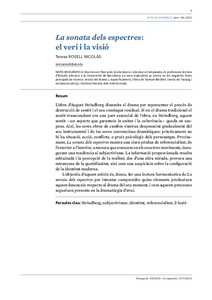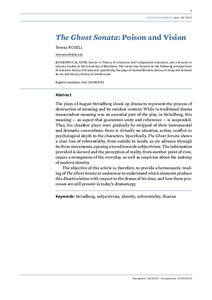| dc.contributor.author | Rosell Nicolás, Teresa | |
| dc.date.accessioned | 2021-01-28T08:37:31Z | |
| dc.date.available | 2021-01-28T08:37:31Z | |
| dc.date.issued | 2020 | |
| dc.identifier.issn | 2385-362X | |
| dc.identifier.issn | 0212-3819 | |
| dc.identifier.uri | http://hdl.handle.net/20.500.11904/1172 | |
| dc.description.abstract | <p>L’obra d’August Strindberg dinamita el drama per representar el procés de destrucció de sentit i el seu contingut residual. Si en el drama tradicional el sentit transcendent era una part essencial de l’obra, en Strindberg, aquest sentit —un aspecte que garanteix la unitat i la coherència— queda en suspens. Així, les seves obres de cambra s’aniran desposseint gradualment del seu instrumental i de les seves convencions dramàtiques: pràcticament no hi ha situació, acció, conflicte, o gruix psicològic dels personatges. Precisament, <em>La sonata dels espectres </em>mostra una clara pèrdua de referencialitat, de l’exterior a l’interior, a mesura que avancem en els seus tres moviments, inaugurant una tendència al subjectivisme. La informació proporcionada resulta esbiaixada i la percepció de la realitat, des d’una altra mirada, provoca una estranyesa de la quotidianitat, així com una suspicàcia sobre la configuració de la identitat moderna. </p>
<p>L’objectiu d’aquest article és, doncs, fer una lectura hermenèutica de <em>La sonata dels espectres </em>per intentar comprendre quins elements produeixen aquest desencaix respecte al drama del seu moment, i com aquests processos segueixen presents en la dramatúrgia d’avui.</p> | |
| dc.description.abstract | <p>The plays of August Strindberg shook up drama to represent the process of destruction of meaning and its residual content. While in traditional drama transcendent meaning was an essential part of the play, in Strindberg, this meaning — an aspect that guarantees unity and coherence — is suspended. Thus, his chamber plays were gradually be stripped of their instrumental and dramatic conventions: there is virtually no situation, action, conflict or psychological depth to the characters. Specifically, <em>The Ghost Sonata </em>shows a clear loss of referentiality, from outside to inside, as we advance through its three movements, opening a trend towards subjectivism. The information provided is skewed and the perception of reality, from another point of view, causes a strangeness of the everyday, as well as suspicion about the makeup of modern identity. </p>
<p>The objective of this article is, therefore, to provide a hermeneutic reading of <em>The Ghost Sonata </em>to endeavour to understand which elements produce this disarticulation with respect to the drama of his time, and how these processes are still present in today’s dramaturgy. </p> | |
| dc.relation.ispartof | Estudis escènics: quaderns de l'Institut del Teatre. 2020, Núm. 45 | |
| dc.title | «La sonata dels espectres»: el verí i la visió | |
| dc.type | Article | |
| dc.date.updated | 2021-01-28T08:37:33Z | |
| dc.rights.access | Open Access | |



